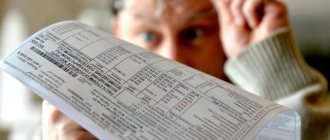2
Utility debts are among the most popular in the Russian Federation. Up to 50% of owners often accumulate debt. Each residential premises may be owned or used by 2 or more citizens. Sole proprietors are a rarity in 2021. The obligation to pay housing and communal services payments falls on all citizens living in the premises. Large debts can be collected by the court from all tenants. Let's consider what joint and several liability for utility debts means.
What is joint and several liability?
Joint and several liability refers to the obligation of each debtor to fulfill the requirements.
If several persons are jointly registered and living in an apartment, they can not only use the premises. They are responsible for its maintenance, including paying for utilities.
Reference! Joint and several liability applies to all persons who have reached the age of majority, have legal capacity and are of limited legal capacity.
What is joint liability and how to avoid it?
Often, residents of the same apartment are not relatives, do not maintain a common household, and their budgets are different, but they receive the same utility bill. In most cases, the amount is paid by each of them in proportion to the occupied premises in the apartment by verbal agreement.
But there are also conflict situations when someone ignores the payment requirement. In this case, conscientious payers need to know how to defend their rights.
The Civil Code of the Russian Federation establishes the following rights and obligations for citizens to whom joint liability applies:
- exemption from payment of debt only if it is fully repaid by the other owner;
- right of recourse to debt payment. The payer has the right to recover damages from the true defaulter;
- participation in costs in proportion to the square meters occupied;
- allocation of a share for each owner;
- acquisition of the defaulter's share by other owners.
How does joint and several liability work?
If joint liability for the debt arises, each citizen must be responsible for it.
The creditor has the right to collect it both from all residents and from each individual. For example, three citizens have a debt of 50,000 rubles. Claims may be brought against three, two or one debtor. If one of them contributes 30,000 rubles to pay the debt, then 20,000 rubles will remain to be paid. The creditor has no right to collect 50,000 rubles from each citizen.
In this case, a citizen who contributed 30,000 rubles can demand compensation from the others. This is called a recourse claim.
Features of joint claims
Not only obligations are joint and several, but also claims, for example, from a group of creditors. Each of them has the right, separately from the others, to demand that the borrower repay the debt in full.
If there is no such requirement, the debtor can pay the debt to any of the creditors. If the debt is paid in full, then the debtor no longer has obligations to other solidary creditors.
The creditor to whom the debt was paid must, in turn, distribute the amount received in equal or contractually determined shares among his partners.
In cases specified by law, debt repayment is permitted through the court or through a notary, to whose deposit the required amount is transferred.
When does joint and several liability arise?
Joint and several liability implies that the management company or service provider can collect the debt from any person living in the apartment. Liability arises in the following cases.
| Special case | A comment |
| The property belongs to one owner | The obligation to pay lies not only with the owner, but also with other legally capable persons. Spouses, parents, as well as other registered citizens are required to pay the debt. |
| The apartment is rented under a social lease agreement | The terms of payment under joint and several liability are specified in the contract. If they are absent, then the employer and his family members are required to make payments. |
How can you divide debts?
When one of the residents of an apartment systematically does not pay utilities, the rest have a question about whether it is possible to divide the rent debt between the residents. The solution to the problem will be:
- division of personal accounts between tenants;
- recovery of damages by the tenant who paid for the services from the defaulter.
The most convenient option is the personal accounts section. This does not affect ownership in any way, but involves a separate charge from the service provider for each resident.
A financial and personal account is issued for residential premises and contains information about:
- home improvement;
- technical characteristics of living space;
- provided utilities;
- all owners or tenants.
As a rule, personal accounts are separated if the housing has several rooms and the kitchen area is at least 6 m2.
If all residents agree with the division of payment, you must contact the management company:
- for tenants under a social tenancy agreement, this will entail the termination of the agreement and the conclusion of a new one with each of the tenants;
- for homeowners, in accordance with Art. 247 of the Civil Code of the Russian Federation - concluding an agreement on payment for housing and communal services with each owner in proportion to the share in the apartment and a separate agreement for payment.
If it was not possible to reach an agreement on payment for utilities between residents, the dispute over separate payment is resolved in court.
Differences between joint and shared liability
As a general rule, citizens bear shared responsibility, in which each debtor fulfills his part of the obligations.
But joint and subsidiary liability are two exceptions to it. For example, an apartment has two owners. If there is a debt for housing and communal services, it is necessary to determine the payment procedure. If the property is not divided into shares, joint and several liability arises. When citizens own only their part of the property, payment of the debt is made in proportion to the shares.
Family members who live in the apartment can also be held jointly liable. But they only have to pay for housing and communal services. The costs of maintaining housing, including the common property of the apartment building, and major repairs are borne exclusively by the owner.
Shared debt repayment
Joint liability for utility debts is provided for residents whose apartment is jointly owned, and citizens own property without a clear delineation of shares. But in some cases, by agreement between residents or by court order, a part of the apartment is allocated for everyone or only for the defaulter.
The division of housing is carried out in two ways:
- in kind - the owner receives possession of a separate room;
- ideally, the share in the apartment is not tangible, but the ownership right is divided among everyone, for example, three owners each receive 1/3 of the apartment.
The accumulated amounts of debt before the allocation of part of the apartment are paid jointly and severally. But after the allocation of shares has occurred, if there are rent debts, only the owner of this part of the housing is responsible for them.
In some situations, even after allocating a share in the apartment or dividing personal accounts, the problem tenant does not pay for housing and communal services. Such debts can no longer be recovered from former owners/bona fide payers. Therefore, management companies submit documents for trial to the court, which:
- consider the reasons for the debt;
- will find out whether the housing is the only one for the defaulter.
After receiving a court decision, if the shareholder does not pay for utilities and the amount of debt has reached the cost of part of the apartment, the bailiffs will offer the remaining co-owners to purchase his share. But this extreme measure is applicable only after identifying the following information:
- the defaulter does not have enough money in his accounts, deposits, or deposits with banks to repay the debt;
- there is no other property from which the debt can be paid.
The process of foreclosure on part of a debtor’s apartment has many nuances and largely depends on how the share was allocated.
Debt collection procedure
The collection procedure will be as follows:
- If there are no payments for more than 2 months, the debtor is notified of the existence of a debt. To do this, the management company sends him a registered letter with acknowledgment of delivery.
- From the fourth month of delay, penalties begin to accrue. For each day of delay, 1/300 of the refinancing rate of the Central Bank of the Russian Federation in the first 90 days is added to the principal amount. Next, the bet is 1/130.
- The claim is sent to the debtor. An agreement is also concluded to contribute funds to repay the debt, to which a payment schedule is attached.
- If the amounts are not paid, the supplier limits the supply of resources for a period of 1 month. Once the invoice is paid, services are resumed within 2 days.
- Collection is carried out through a court of general jurisdiction if pre-trial settlement does not produce results.
Features of judicial practice
Judicial practice in 2021 on the division of accounts or the cancellation of joint and several liability orders is varied. Writ proceedings are always more numerous than claims proceedings in terms of the number of decisions made.
Such decisions are considered only at the place of residence of the debtors. The issuance of orders and their cancellation is a matter for justices of the peace; claims for the division of personal accounts are matters for district courts.
In court, although court orders for debt collection are canceled, claims on the same issues in dispute are still satisfied. Therefore, in fact, residents cannot avoid paying the debt on utility bills; at best, they manage to delay the moment of collection.
In case proceedings, decisions to collect debt for utility bills in the manner of joint and several liability come into force one month after they are made. During this time, defendants may attempt to appeal the decisions to the appellate court.
Claims for division of accounts are almost always satisfied, even if the other party, in the form of another tenant, does not participate in any way in the dispute or speaks out against such division.
Payment of debts on utility bills is the responsibility of the owners of apartments, houses, rooms and other residential real estate . In a situation where the owner of the premises fails to pay debts, management companies have the right to collect these payments jointly from other residents of the premises.
Solidary collection of debts for utility bills is carried out in the order of writ proceedings.
Judicial practice of debt collection for utility bills
After considering court cases regarding debt collection, it is worth highlighting the main points:
- If there are no payments for 2-3 months, the management company may go to court. If the debt is less than 500,000 rubles, a court order may be issued. If the amount is larger, the case is considered in the procedure of claim proceedings.
- The statute of limitations, in accordance with paragraph 1 of Article 196 of the Civil Code of the Russian Federation, is 3 years. It will not be possible to collect debt incurred before this period.
- You can collect a debt by issuing a court order without the presence of the defendant.
- The court decision can be appealed by the defendant within 1 month. You have 10 days from the date of receipt of the document to appeal the court order.
- Upon receipt of the decision, the owner must deposit funds in a lump sum or pay the debt according to a schedule.
- If payment is not made, bailiffs initiate proceedings. They can put a citizen’s property up for sale, seize bank accounts, withhold funds through the accounting department at work, or issue a ban on traveling abroad.
As for joint and several liability, if there are two debtors, a lawsuit is filed against each of them. Thus, the Kislovodsk City Court of the Stavropol Territory accepted an application from Gazprom Mezhregiongaz Stavropol LLC to citizens T. and F. They had arrears not only in paying for gas, but also in penalties. Each of them was presented with separate claims for debt on one residential property.
Joint and several liability of municipal debtors - collection procedure and features of attraction
Category: Housing and communal services.
The law provides for joint liability for debts for housing and communal services. This type of liability is one of the most common among joint and several penalties and creates additional guarantees for providers of these services.
Utilities concept
Utilities mean the provision of various natural resources from suppliers to consumers on the basis of an agreement at clearly established tariffs. At the same time, the fees for these services are regulated and controlled by the state.
Types of utilities and their costs
- Water supply – both cold and hot. This service consists of supplying water directly to apartments, private houses and other premises. Such water must meet established standards and be potable. The cost of services is calculated based on the readings of metering devices, and in their absence, according to generally established standards.
- Heat supply. The provision of heat is one of the most expensive public services and represents the supply of heat through heating networks to residential and non-residential premises. The price of this service is determined by meters or according to general tariffs.
- Drainage. It is carried out by discharging wastewater into treatment facilities through central and house networks. The fee for this service is clearly fixed.
- Gas supply. It is carried out using special systems installed in the house through gas pipelines. The volume of gas consumed is also recorded by metering devices.
- Electricity supply. Electricity is supplied to consumers through the power grid, and its cost depends on several factors - the amount of electricity consumed, its purpose, and the availability of benefits.
- Other public services, such as garbage removal, repair and maintenance of houses and local areas, elevator maintenance and others.
Payment for utility services is carried out on the basis of contracts, meter readings and invoices issued by service providers. If the consumer does not make utility payments, but uses the services provided, the contractor has the right to forcibly collect the debt for utility services. In this case, collection is carried out jointly and severally.
The concept of joint liability for failure to pay utility bills
Joint and several liability is one of the forms of legal liability, according to which the owner or tenant of the premises, as well as members of his family, have equal obligations to pay utility bills. Such responsibility is enshrined in law and also regulated in contracts.
How to divide your personal account for utility bills
Features of joint liability for debts in the field of utilities
- Debt collection for utilities is carried out not only from the owners of the premises, but also from their family members. That is, all family members living together are jointly and severally liable. In this case, family members must live together with the owner and use the services.
- Tenants of housing under a social tenancy agreement and members of their families also bear joint liability to the providers of public utility services.
- The service provider has the right to independently determine the circle of persons from whom it will collect. These may be all solidary debtors, or there may be only one of them.
- The obligation to the utility service provider is considered fulfilled upon full payment of all payments. In this case, it does not matter for the supplier which of the service recipients will make the payment.
- If the debt is paid by one of the joint and several debtors, he can subsequently, by way of recourse, recover part of the funds from other recipients of utility services.
Controversial issues in the collection of utility bills in solidarity
The situation has not been regulated at the legislative level when one of the family members is a conscientious payer of housing and communal services and promptly pays for services provided in the amount due to him, while other family members ignore their obligations to make utility payments.
In this case, the supplier is not obliged to establish who exactly paid partial contributions, since responsibility for failure to pay utility bills is joint and several. In court, a bona fide payer will have to prove that he made his payments specifically for the use of the services provided by him, providing relevant evidence.
Consequences of non-payment of utility bills
- Accrual of penalties for improper fulfillment of obligations in the form of penalties.
- Complete or partial termination of utility services. In this case, the burden of the cost of resuming its provision falls on the consumer of the service.
- In the event that the housing, for the use of which the established payment is not made, is municipal, eviction may be applied.
Pre-trial settlement of a dispute regarding utility obligations of joint debtors
Service providers - management companies, resource supply organizations, housing cooperatives, homeowners' associations - before filing a lawsuit in court, send debtors a claim for payment of the debt. This claim is sent to each debtor who is jointly and severally liable. It proposes to resolve the current debt situation without judicial intervention.
The claim indicates the legal basis for its submission, the amount of debt and penalties, as well as the deadline for fulfilling the obligation. In case of failure to comply with the requirements of the utility service provider, a judicial procedure for debt collection is inevitable.
Joint and several debtors can turn to service providers for installment plans or debt restructuring. In most cases, utility companies meet payers halfway and enter into a restructuring agreement with them with an appropriate payment schedule.
Collection in court of debt under joint and several obligations
1. The law gave utility service providers the right to apply to the court in a simplified form for the issuance of a court order. Such an appeal is formalized by an application indicating the parties, the contract, the volume of services provided and the amount to be collected.
The court, without holding court hearings, issues court orders for each joint debtor, which the latter can cancel if they disagree with them. The order is sent to the bailiff service for execution, which opens enforcement proceedings and forcibly collects money from debtors. In this case, collection is made from all debtors.
2. If the court order was canceled by the court at the request of one of the joint and several debtors, the utility service provider has the right to file an application with the court in a lawsuit. In this case, the claim will be considered in open court with the parties summoned, each of whom must substantiate its position and present evidence. Meetings are held on the basis of competition and transparency.
If joint and several debtors disagree with the amount of the debt, they must prove its absence by providing proof of payment or evidence of improper provision of utility services. This can be payment documents, photos and video materials, witness statements and any other facts.
By its decision, the court will resolve the dispute between the utility service provider and joint payers.
This decision can be appealed by the parties on appeal, and then to the cassation instance. In this case, the losing party will pay all costs incurred to pay the state duty.
Debtors may ask the court to grant them an installment plan and (or) a deferment in the execution of the court decision, justifying this with motivated explanations - difficult financial situation, some life situations.
3. After the judicial act comes into force, the claimant receives a writ of execution, which must be sent to the FSSP for collection.
Thus, collection of debt for utility bills is, in essence, no different from other types of joint and several liability. However, the consequences of non-payment of utilities, in addition to forced collection of the debt, also have negative consequences in the form of suspension of their supply.
- Back
- Forward
Questions from our readers
Is it possible to be held jointly and severally liable if registered in another place?
In accordance with paragraph 5 of part 2 of Article 153 of the Housing Code of the Russian Federation, from the moment ownership rights arise, the owner of the property is obliged to pay fees for housing and communal services. But the question often arises: should a citizen living in an apartment with the owner, but registered elsewhere, have to pay?
The Supreme Court of the Russian Federation ruled that payment of utilities is not affected by registration at the place of residence. The court relies on Article 153 of the RF Housing Code, which reflects the list of persons responsible for payment. Legally capable family members who have retained the right to use the residential premises must pay jointly with the owner for the use of services. It does not affect what address they are registered at.
How to divide the debt under a writ of execution?
Judicial practice shows that dividing the debt under a writ of execution is difficult. A citizen can make a recourse claim. But it is possible to return the funds by collecting from the second owner or residents only after full payment of the debt.
Conflict resolution options
If for some reason the payment for all utilities falls on one or more residents, and one of the residents maliciously does not fulfill his obligations, it is necessary to seek help from the authorities or find a compromise peacefully.
Possible solutions:
- Pay off all rent arrears and file a claim against the defaulter in court. With a demand to recover from him part of the amount paid by the plaintiffs in his place.
- Agree peacefully and enter into a written agreement regarding the procedure and amount of payment participation. It is advisable to have such a document notarized.
- File a claim in court, demanding to forcefully determine the procedure and amount of participation in expenses for paying for housing and communal services. By decision of the court, the financial rights and responsibilities of each capable family member will be determined. The personal account will be divided and everyone will be responsible for their own.
The second and third options are regulated by paragraph 30 in the Resolution of the Plenum of the Supreme Court of the Russian Federation dated July 2, 2009. The nuances of individual situations are answered in the current Housing Code of the Russian Federation.
What to do if you are not paying your debt?
Few people will be pleased to pay other people's debts, even while living in this apartment. To avoid getting such problems unexpectedly, you need to:
- Before moving into an apartment, even if it is one of your family members, check the information on housing and communal services debts.
- Before buying an apartment, ask the owner for a fresh certificate stating that there is no debt for housing and communal services. But, even if it happens that it exists, they have no right to recover it from the new owner, with the exception of the amount of major repairs.
If the matter comes to the bailiffs, then it will no longer be possible to cancel the collection. In this case, you need to negotiate with the person responsible for the debt so that he pays himself. But even if he does not pay, after the completion of enforcement proceedings, you can go to court with regressive claims for the debt. The court will order him to pay compensation.
If you find yourself in a similar situation, you can contact us for legal advice – it’s free.










